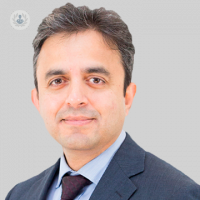Colon cancer: how to spot it early and avoid it
Written by:Early diagnosis of colon cancer is vital. Over 93% of people diagnosed with bowel cancer at an early stage survive for at least five years compared to less than 7% of those diagnosed at a later stage. Fortunately, five-year survival rates for bowel cancer have doubled over the last 40 years.
More than eight in 10 cases of bowel cancer occur in people aged 60 or over, but bowel cancer can affect people of all ages. Mr Atif Alvi talks about the early warning signs of colon cancer, the different stages and how it is currently treated.

What are the early warning signs of colon cancer?
Some people with bowel cancer have the disease or are at risk of it developing before any symptoms appear.
The most common signs of colon cancer are:
- A persistent change in bowel habits, especially going more often or looser stools
- Bleeding from the bottom
- Abdominal pain
- A lump in the tummy
- Unexplained weight loss or tiredness (anaemia)
Is there a way that colon cancer can be prevented?
Certain steps can be taken to minimise the risk of colon cancer, including:
- Following a healthy diet. This means eating lots of fruit, vegetables, wholegrain foods and fish, and less fat, red and processed meat
- Exercising regularly and maintaining a healthy weight
- Giving up cigarettes
- Controlling your alcohol intake
- Knowing your body and how it usually functions so that you can recognise changes in your bowel habits
What happens during a colon cancer screening?
Regular bowel cancer screening has been shown to reduce deaths from bowel cancer by 16%. The NHS Bowel Cancer Screening Programme offers screening every two years to all men and women aged 60 – 74. The programme is designed to find people who are at risk of developing colon cancer or who have it but don’t have any symptoms.
How are the different stages of colon cancer treated?
The best treatment for bowel cancer is surgical removal. Stage one and two cancers are treated with direct surgery.
Most cases of stage three cancer are treated with either surgery first, followed by chemotherapy or if locally advanced, treated with chemotherapy and/or radiotherapy to shrink the tumour followed by surgery.
Stage four cancer is the most advanced stage, with cancer spreading to distant organs such as the liver and lungs. Treatment for this stage is usually palliative, but with modern advances in treatment, some patients can be treated. Generally, chemotherapy is offered first, followed by a resection of primary cancer, then resection of the liver or lungs, whichever has been affected by cancer.
What is remission and the chance of recurrence?
Chances of a five year survival rate are as follows:
- Stage 1 = 93%
- Stage 2 = 70%
- Stage 3 = 47%
- Stage 4 = 6.6%
For most people, cancer doesn't come back, or “recur.” However, in about 35% to 40% of people treated for colorectal cancer with surgery and with or without chemotherapy, the cancer may come back within three to five years after treatment.
After being successfully treated for cancer, follow-up appointments may be as frequent as every three months. This is because 60% to 80% of colon cancer recurrences develop within two to three years of the primary malignancy.
If you have any symptoms like those mentioned above, especially if you’re over the age of 60, make an appointment with your doctor. Find Mr Atif Alvi’s profile here.


